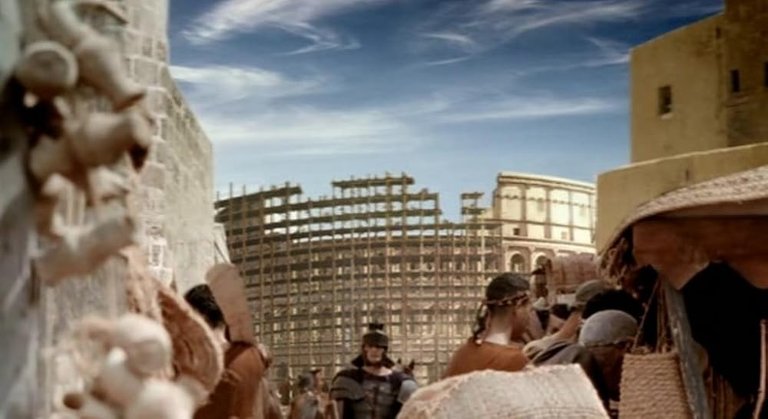
The Flavian Dynasty, a pivotal period in Roman history, is often overlooked by creators of historical dramas, despite its lasting legacy in the form of the Colosseum, arguably the most iconic symbol of Roman civilisation. The BBC, in a commendable effort to redress this imbalance, produced the 2003 docudrama Colosseum: Rome’s Arena of Death. This film not only sheds light on the Flavian emperors but also explores the cultural and historical significance of the Colosseum, offering a rare glimpse into a period that has been largely neglected by mainstream media. By focusing on the inaugural games held in 81 AD, the film provides a compelling narrative that combines historical accuracy with dramatic storytelling, making it a noteworthy addition to the genre of historical docudramas.
Colosseum: Rome’s Arena of Death, also known under the alternative title Colosseum: A Gladiator’s Story, was written and dirrected by Tillman Reme and produced as collaborative effort between the BBC, France 2, NDR, and the Discovery Channel. This production followed closely on the heels of Building the Great Pyramid, another historical docudrama that garnered critical acclaim for its innovative blend of documentary and dramatic reconstruction. Colosseum adopts a similar formula, seamlessly integrating conventional narration, which provides the necessary historical context, with dramatic re-enactments that bring the past to life. This hybrid approach allows the film to appeal to both history enthusiasts and general audiences, offering an engaging yet informative viewing experience.
The film centres on the inaugural games at the Colosseum in 81 AD, a grand spectacle that captivated the Roman masses with its unprecedented scale and variety of entertainment, most notably gladiatorial combat. The dramatic plot is rooted in historical fact, drawing inspiration from Marcial’s poem, the only contemporary literary account of a single combat in the arena that names the participants. The protagonist, Verus, portrayed by Robert Shannon, is a captured warrior from Moesia whose combative prowess earns him a place as a gladiator. The narrative follows Verus as he trains and forms a bond with fellow gladiator Priscus, played by Derek Lea, only to discover that he must eventually face him in mortal combat. Parallel to this storyline is the depiction of Emperor Titus, played by Jamel Aroui, who is determined to complete the Colosseum on time and win the favour of the Roman populace after a series of calamities, including a devastating fire, a plague, and the eruption of Mount Vesuvius, which destroyed Pompeii.
The film strikes a careful balance between scholarly rigour and dramatic storytelling, leaning more towards the former. While the cast delivers solid performances, the emphasis remains on historical authenticity. Robert Shannon and Derek Lea, with their impressive physiques and convincing martial arts skills, embody the gladiatorial spirit effectively. The use of CGI, though limited, enhances the visual appeal, while the production’s reliance on sets and props left behind from the 1985 miniseries A.D., filmed in Tunisia, adds a layer of authenticity. However, the film’s commitment to historical accuracy means that it lacks the grandiose spectacle of Ridley Scott’s Gladiator or the sensationalism of Starz’s Spartacus. Instead, it offers a more nuanced portrayal of gladiatorial life, dispelling common myths and presenting gladiators as the celebrated athletes of their time, akin to modern-day rock stars. The film highlights their privileged status, including access to the best food and medical care, and the fact that only a small fraction of arena duels ended in death. It also touches on their popularity among the Roman elite, drawing subtle parallels with contemporary celebrity culture without overemphasising the comparison.
While Colosseum was generally well-received by audiences, it did not generate the same level of enthusiasm as Building the Great Pyramid, perhaps due to the novelty of the latter having worn off. A week after its release, the BBC aired Pompeii: The Last Day, a docudrama that can be seen as a prequel to Colosseum, given the shared character of Tiberius Claudius Eutychus, played by Nicholas Chagrin. Despite depicting a far more spectacular event, Pompeii failed to match the narrative depth and historical insight of Colosseum, leaving viewers somewhat disappointed.
Colosseum: Rome’s Arena of Death is a commendable effort to bring the Flavian Dynasty and the cultural significance of the Colosseum to the forefront of public consciousness. While it may lack the visual grandeur of other Roman-themed productions, its commitment to historical accuracy and its thoughtful exploration of gladiatorial life make it a valuable contribution to the genre.
RATING: 6/10 (++)
Blog in Croatian https://draxblog.com
Blog in English https://draxreview.wordpress.com/
InLeo blog https://inleo.io/@drax.leo
Hiveonboard: https://hiveonboard.com?ref=drax
InLeo: https://inleo.io/signup?referral=drax.leo
Rising Star game: https://www.risingstargame.com?referrer=drax
1Inch: https://1inch.exchange/#/r/0x83823d8CCB74F828148258BB4457642124b1328e
BTC donations: 1EWxiMiP6iiG9rger3NuUSd6HByaxQWafG
ETH donations: 0xB305F144323b99e6f8b1d66f5D7DE78B498C32A7
BCH donations: qpvxw0jax79lhmvlgcldkzpqanf03r9cjv8y6gtmk9
Posted Using INLEO